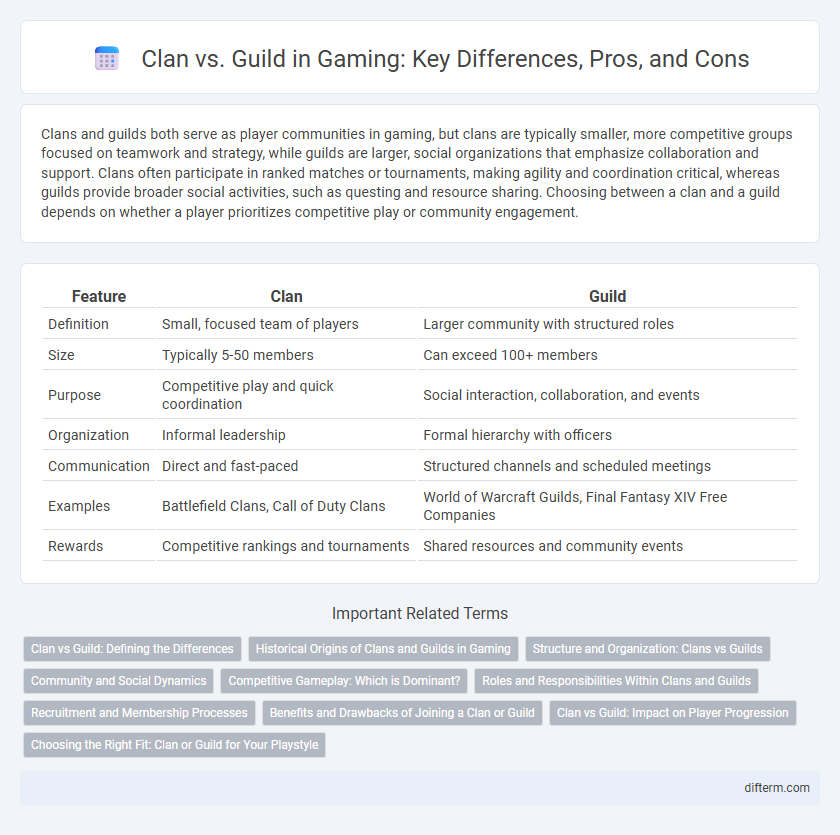Clans and guilds both serve as player communities in gaming, but clans are typically smaller, more competitive groups focused on teamwork and strategy, while guilds are larger, social organizations that emphasize collaboration and support. Clans often participate in ranked matches or tournaments, making agility and coordination critical, whereas guilds provide broader social activities, such as questing and resource sharing. Choosing between a clan and a guild depends on whether a player prioritizes competitive play or community engagement.
Table of Comparison
| Feature | Clan | Guild |
|---|---|---|
| Definition | Small, focused team of players | Larger community with structured roles |
| Size | Typically 5-50 members | Can exceed 100+ members |
| Purpose | Competitive play and quick coordination | Social interaction, collaboration, and events |
| Organization | Informal leadership | Formal hierarchy with officers |
| Communication | Direct and fast-paced | Structured channels and scheduled meetings |
| Examples | Battlefield Clans, Call of Duty Clans | World of Warcraft Guilds, Final Fantasy XIV Free Companies |
| Rewards | Competitive rankings and tournaments | Shared resources and community events |
Clan vs Guild: Defining the Differences
Clans and guilds differ primarily in their structure and purpose within gaming communities, with clans typically emphasizing competitive play and organized team battles, while guilds focus more on cooperative gameplay and social interaction. Clans often require strict membership criteria, ranking systems, and regular participation in tournaments or clan wars, whereas guilds provide a more casual environment centered around questing, resource sharing, and group support. Understanding these distinctions helps players select the right group to enhance their gaming experience based on their preferred style of collaboration and competition.
Historical Origins of Clans and Guilds in Gaming
Clans and guilds in gaming trace their roots to early multiplayer games and role-playing traditions, with clans originating from competitive shooter communities in the late 1990s and guilds stemming from tabletop RPGs like Dungeons & Dragons. Clans typically emphasize team-based competitive play and ranked matches, while guilds evolved as cooperative social groups in MMORPGs such as EverQuest and World of Warcraft. Both entities foster player collaboration and identity but reflect distinct historical purposes shaped by different gaming genres and player interactions.
Structure and Organization: Clans vs Guilds
Clans often consist of smaller, tightly-knit groups with a simple hierarchy centered around a leader or co-leaders, emphasizing quick decision-making and casual play. Guilds typically feature larger, more complex organizational structures with multiple ranks, committees, and specialized roles to manage diverse activities like raids, events, and member recruitment. The structured environment of guilds supports long-term collaboration and strategic planning, while clans prioritize flexibility and faster communication.
Community and Social Dynamics
Clans and guilds both foster strong community bonds but differ in social dynamics; clans often emphasize competitive teamwork and smaller, tightly-knit groups, while guilds typically support larger, more diverse memberships with collaborative and social activities. Guilds encourage long-term relationships through structured events, role assignments, and inclusive participation, whereas clans prioritize strategic coordination and hierarchy for in-game achievements. Understanding these distinctions enhances player engagement and community cohesion within multiplayer games.
Competitive Gameplay: Which is Dominant?
Clans often dominate competitive gameplay due to their smaller, tightly-knit teams that enable faster communication and more coordinated strategies. Guilds, with larger memberships, excel in sustained, large-scale battles but may face challenges in agility and swift decision-making during intense competitions. Esports titles like Call of Duty and Valorant showcase clan superiority in rapid tactical execution, while MMORPGs like World of Warcraft highlight guild effectiveness in large raid-based content.
Roles and Responsibilities Within Clans and Guilds
Clans primarily focus on competitive gameplay roles, organizing members around specific functions such as tank, DPS, and support to optimize team performance in battles. Guilds emphasize broader responsibilities, including social engagement, resource sharing, and event coordination, fostering a supportive community environment. Leadership roles in both often include clan leaders or guild masters who manage recruitment, strategy, and conflict resolution to maintain group cohesion.
Recruitment and Membership Processes
Clans typically emphasize streamlined recruitment with quick acceptance to foster tight-knit teams, often requiring minimal in-game achievements or social bonds. Guilds usually implement structured membership processes, involving application forms, interviews, or trial periods to ensure commitment and skill level alignment. Both entities prioritize active participation, but guilds often maintain larger, more diverse memberships with hierarchical roles to manage growth effectively.
Benefits and Drawbacks of Joining a Clan or Guild
Joining a clan offers tightly knit teamwork and faster decision-making, ideal for players seeking competitive gameplay and regular events, but it may limit social diversity and personal flexibility. Guild membership provides broader social connections and diverse activities, enhancing cooperative play and resource sharing, though it can lack the focused coordination and strict hierarchy found in clans. Both offer unique benefits and drawbacks depending on player preferences for structure, community, and gameplay style.
Clan vs Guild: Impact on Player Progression
Clans and guilds provide distinct frameworks affecting player progression, with clans emphasizing competitive teamwork and rapid skill advancement through structured events and ranked matches. Guilds foster a more collaborative environment, supporting long-term growth via resource sharing, cooperative quests, and social engagement. The choice between clan or guild participation significantly influences access to exclusive content, in-game rewards, and overall character development speed.
Choosing the Right Fit: Clan or Guild for Your Playstyle
Choosing between a clan and a guild depends on your gaming style and community preferences. Clans often emphasize competitive play with a tightly-knit group focused on teamwork and ranked matches, ideal for players seeking intense, structured competition. Guilds tend to offer a more social, inclusive environment with a variety of activities and cooperative gameplay, perfect for those who prioritize camaraderie and casual interaction.
Clan vs Guild Infographic

 difterm.com
difterm.com